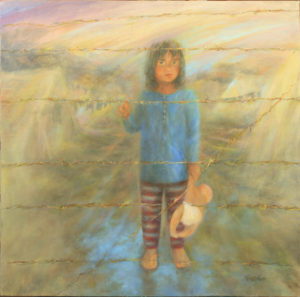Peter Claver, a 16th century Spaniard, was canonized by the Roman Catholic church as a saint in 1888, but he is not well-known. He was born in 1581 and entered the Jesuits there in 1601. In 1610 he went to the missions in America, landing in Cartagena, a port city in what is now Columbia, that was a major stop for slave ships. He was ordained in 1616 and spent his life serving the 10,000 enslaved Africans who arrived every year.
Claver considered himself a slave to the slaves and began ministering to them from the time the ships docked. He made his way into the hold, encountering people who had survived the most horrid conditions imaginable. (About one-third of them didn’t.)
The image I have of Peter Claver is one of a man moving among the people, providing food and water, medicine and care as he treated their physical wounds. “Deeds come first, then the words,” is a quote attributed to him. His life bears that out. It was attention to basic human needs that came first. Only later, using translators and sometimes pictures, would he try to communicate with the Africans some ideas of Christianity and God’s love for them.
Through his deeds and words, Claver treated people with respect, honoring the dignity due every human being. No exceptions. That’s the lesson of his life that stays with me today.
While 400 years have passed since the first slave ship arrived on our shores, the repercussions of slavery remain. Racism is deeply embedded in our country and continues to deny this most basic right to our African American sisters and brothers, challenging us to respond.
Dehumanizing people, marginalizing them is all too easy. The list of “reasons” is long: People look “different,” speak another language, embrace a faith different from our own. Fear of difference, threats to one’s way of life, ignorance—These are on the list, too.

Painting by Laurie VanBalen, Project Director and Producer of Columbus Crossing Borders Project
As I thought of Peter Claver’s instinctive action to first alleviate human suffering, the plight of refugees at our Southern border came to mind. They come mostly from Central and South America, fleeing unspeakable violence, poverty, and fear for their lives. How are they met?
I spoke with Sister Barbara Kane, a member of the Dominican Sisters of Peace in Columbus, Ohio. She and others in her community have traveled to El Paso to serve as they could.
She spoke of refugees’ long waits in enclosed areas (some liken them to cages) until they have their Credible Fear Hearing (when the refugee states what has driven them to seek asylum.)
“The enclosures have concrete floors, are kept at 60 degrees, and are so small people are packed together, unable to lie down to sleep,” Sr. Barbara said. People receive little food. Yet, despite the great needs, no one is allowed inside to help.
After the Credible Fear Hearing, people are sent back to Mexican cities to wait again until their sponsors can be reached, and background checks run. The cities are not equipped to house so many refugees whose stay can last for weeks or months.
Once sponsors are contacted and cleared, the asylum seekers come back to the U.S and are placed in hospitality houses. The Annunciation House is where Sr. Barbara served.
“That’s where volunteers finally meet the refugees and offer help. We provide a hot shower, clean clothes, food, and a bed to sleep in,” Sr. Barbara said. Eventually, volunteers drive the refugees to the airport or bus terminals as they begin the journey to their sponsors. With fewer people making it through to this point, volunteers may have time to listen to the refugees’ stories.
“I came away convinced that the vast majority of these parents just want their children to be safe and secure and to have a future,” Sr. Barbara added. “They’re not gaming the system. They’re not bad people. They’re good, loving parents.”
If you, like me, are unable to go to the border to help in person, there are a variety of ways to support those who do. A quick Google search will provide many options. Sr. Barbara offers these suggestions for donations:
- Donate directly to the Annunciation House at their website: annunciationhouse.org/contact, or send a check to 1003 E. San Antonio Ave., El Paso TX 79901-2620.
- The Diocese of El Paso ministry, Diocesan Migrants and Refugee Services, Inc. accepts online donation: dmrs-ep.org; or mail a check to DMRS, 2400 Yandell Dr. El Paso TX, 79903.
© 2019 Mary van Balen

Enjoyed your writing Mary. As always.
Thank you, Judy. I’m glad you did. Thank you for letting me know.
Thank you for introducing me to Peter Claver and for this very important piece
You’re welcome, Keith. His deeply compassionate response to the human needs of the enslaved Africans spoke more truly of the Divine Love Jesus revealed in his own life than any words that followed his actions. What lessons for a world torn apart by fear of and violence toward the “other.” Thank you for your comment.
Good story once again and a call to action. Thank you for including information as to where we can help. St Peter claver pray for us.
Thank you, Kathy, for your work and your prayer!
Enjoyed your message on “Deeds Come First”
Thank you, Barbara. I’m glad you enjoyed it. Thanks for taking the time to let me know.
Mary